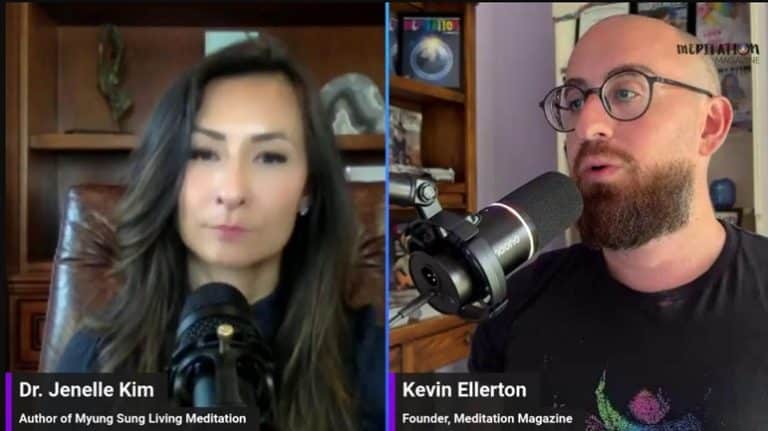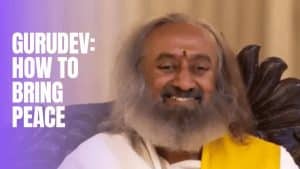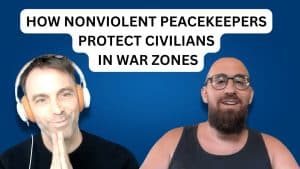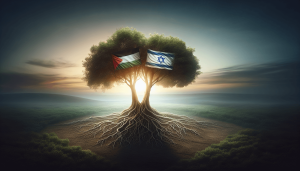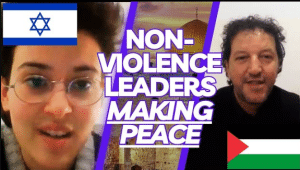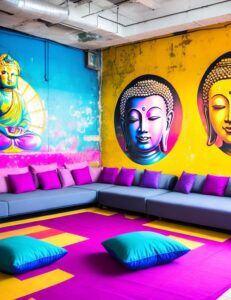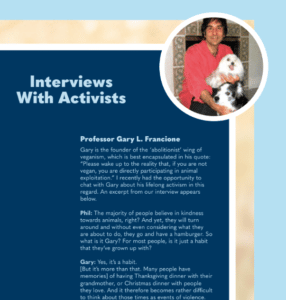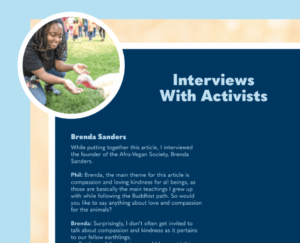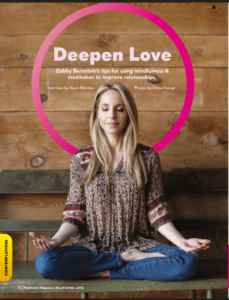Speakers:
- Kevin Ellerton
- Dr. Jenelle Kim
- Thiik Machol
- Satish Kumar
- Jessica Popp
- Elsie Johnson
- Sristi Priya
- Jakub
- Veesh
- Liza Colpa
Kevin Ellerton:
Yeah, I think it’s supposed to start in a few minutes. Oh, we are live now. It’s been a long day; we are not even sure when we’re live or not, but it’s fine. So, uh, we’re gonna, yeah, we just had some really powerful conversations in the past two sessions with Israeli and Palestinian parents who have lost sons in the war, and we just had Nonviolent Peaceforce, which was an epic 90-minute conversation that was, uh, it didn’t feel like 90 minutes, but it is tiring for us as hosts, so we’re getting there. But that was amazing, just the way they were talking about, um, I just thought it was really important to acknowledge that, you know, as an ideology, non-violence—like, they’re not taking it as an ideology, they’re taking it as something that can practically be applied, and maybe not forever.
I really liked what Tiffany said about, “I’m not a pacifist yet, I hope to get there at some point.” Like, I feel that way too, like maybe there are some people that are just more evolved than I am spiritually and understand things that I don’t understand. Maybe my idea that nonviolence is not usable in all situations just makes me spiritually unevolved. But, you know, that’s where I’m at right now, so I have to accept that. But I really loved what Tiffany was saying about just, “We use nonviolence as much as we can, and if we need to, other means may be necessary.” I thought that was a great answer.
Dr. Jenelle Kim:
I agree. And another kind of common theme that I’m sure at the very end of this, we can also sum up some of these points. But in this moment right now, it’s the understanding of patience, and I love how they’re using that, that sometimes the most that we can do, which can be so powerful—we all know this even in our personal lives—is to sit with someone in their discomfort and listen. You know, and that also gives us the time to be able to broaden our perspective, which is always a choice. But again, that’s another theme we keep hearing, that when we’re able to broaden our perspective, we can see more clearly. I mean, again, that’s living meditation, that’s what I know, and I can’t live without it. It allows us to look at other situations to the best of our ability in a different way, or at least be open to understanding where someone else is coming from, and the patience to realize it might not happen tomorrow.
And as you just said, Kevin, Tiffany, Nick, the Parents Circle, everyone that we’ve spoken to has lived that, sitting in that patience.
Kevin Ellerton:
Yeah, what you’re saying about sitting with the discomfort—like you said, it’s a meditation thing, it’s equanimity, being able to sit with the things that are difficult. That is really the essence of meditation in a strong way, is being able to sit with things that make us uncomfortable. And I think what she was saying, what Tiffany was saying, and what Nick was saying, was that people are frustrated, and that they’re so frustrated that they just sort of—even if it’s not physical violence, it’s almost like emotional violence against the other.
Dr. Jenelle Kim:
Yes.
Kevin Ellerton:
Yeah, and I think it plays out so strongly. You can see it here in the United States, the university protests and everything like that right now, but just in general, all of the one-sidedness and the hate. I think it really is a manifestation of that frustration, and that frustration that Nick was talking about is a manifestation of really the sincere desire to help and the empathy and the pain and the compassion for wanting people to be okay and to help people. So it’s, even though it’s this sad…
Oh wait, so somebody said, Joanna said, “I can see and hear the live feed.” Okay, thank you, Joanna, thank you for letting us know, I appreciate that.
Dr. Jenelle Kim:
Yes.
Kevin Ellerton:
Yes, that’s my wife, Joanna, by the way, if anybody doesn’t know.
Dr. Jenelle Kim:
Yes.
Kevin Ellerton:
Yes, so okay. So, yes, even though the manifestation of the one-sidedness and the hate comes out in such a sort of emotionally violent way, if we trace it back to the root of where it’s coming from, really, we can see if we have empathy for people. If we’re able to look into the souls of people and understand that under all of the hatred is really, at the core, compassion and love and a desire to help.
Dr. Jenelle Kim:
Yes.
Kevin Ellerton:
And I think if we remember that, that can help us in being able to make peace with those people and try to bring them into the fold of being peacemakers rather than being agitators.
Dr. Jenelle Kim:
Yes, agreed. And that’s something that all of us can practice every moment of our lives. It doesn’t matter what role we are in, whether it is in a relationship, even as parent and children, in business—it really does not make a difference. This practice remains the same, it is a practice, it is a constant. And that’s another theme that I keep hearing that definitely resonates, is that it is a constant reflection and a constant practice, as I just said. And also, something that Tiffany noted in the end, which definitely hits—I hope everyone hears this—is that there’s not a place in the world that is not, you know, experiencing kind of—I don’t have a perfect word for it—but there’s not a place in the world that is not in some way, shape, or form in this challenge and these complexities. This is an incredibly important time to have these practices, to open our minds, to remember that we’re all human. Because everywhere we turn, there’s conflict right now, it seems. At least that’s the feeling that I know myself, so much of my community, when I go out into the world to teach, I see so much of that more than I ever have in my life right now. So really grateful for these conversations and reminders.
Kevin Ellerton:
Yeah, and you know, what we were talking about with the mothers who had lost children—both of them, when I said, like, “What can we do with people who are kind of just kind of agitating instead of trying to make peace and people who are, you know, taking one side and things like that?”—and they were saying, “Show them a story of a parent who’s lost a child. Show them a real person,” you know, and make them realize that making more conflict is not the answer. To be able to find peace is the answer, peace is the answer. And yeah, I think Thiik Machol, who I’m going to play his video in a moment, from the interview just a couple of days ago, I absolutely think he is a great example, and he also speaks to this very well. And he has a focus on helping to heal the wounds of his country, South Sudan, which split off from the main country of Sudan—well, the bigger country of Sudan—recently. I don’t remember the exact year, but South Sudan is the newest country in the whole world. And Thiik talks about the tribalism that is causing a lot of the problems, and he extrapolates that those problems are also causing the major conflicts in Sudan, even though the conflict in Sudan is between the RSF and the government. A lot of it has to do with tribalism as well. So I’m going to share that video now, and let’s see if I can get that on screen. Video file, I think.
Thiik Machol:
I’m here with Thiik Machol. Okay, I’m going to play this and I’m going to put this on the main screen. He is a Sudanese refugee living in Uganda, currently working with the government in Uganda to help the Sudanese refugees. He has left his homeland of South Sudan because of the conflicts there. So, Thiik, thank you for being here with me today. What’s going on in Sudan right now? What is the main problem and what is the conflict about?
Thiik Machol:
The problem is all about tribalism, lack of trust, misunderstanding, and lack of good communications. These are the main problems that we have in South Sudan currently. The lack of trust comes because of the availability of tribalism. Because when you see your tribe as very important, more than the other tribe, then there is no trust. So our main problem in South Sudan is the lack of trust and misunderstanding among us. I was born and believed in a society where I believed my only tribe is the best tribe that ever existed in South Sudan because the way they talk about others, it means that they are the only best tribe that we have within South Sudan.
But it came to my notice that when I was traveling to the refugee camp in Uganda, so at the border, the person who hosted me for like a week and a half was someone from a different tribe, a tribe that has a misunderstanding with my own tribe. So it happened I went to the reception, and when I arrived there, I never had anything for sleeping, like even a bedsheet. I had none. I had only my bag, and in the bag, they were only clothes. So there’s this young
man who was going to the camp with his sister. The guy welcomed me and said, “Come, we stay.” And I was like, “No, I can’t.” I refused. We negotiated for about an hour until I accepted because there was no other option that I had on that day. My own fellow tribe, nobody was willing to welcome me to spend a night at their place. But this guy called me and said, “You come, we share my bed,” and sent his sister to go and sleep with someone else. So I accepted and shared the bed with this person from a different tribe.
So at night, I couldn’t sleep because, to me, I was thinking that this person wanted to kill me because I never trusted them. Like the way they don’t trust us, I didn’t know what came onto him. So I spent a whole night without sleeping, thinking that the guy would wake up anytime to attack me or to kill me when I’m sleeping. Until in the morning when I woke up and found nothing happened to me. The following day, again, it repeated itself. I spent three sleepless nights, and on the fourth day, I gave up, saying, “If this guy wants to kill me, let him kill me because I’m now tired.” Like three days without sleeping, let me just try to sleep. If the guy kills me, I am not the only person that will stop others from dying. We shall all die any day, anytime. So, and I slept. I woke up, and nothing happened to me.
So I spent one week and a half sharing the bed with this guy. And their tribe, they don’t even stay together with our tribe. They don’t love each other; they don’t support each other. Actually, we are the major reason why South Sudan is in conflict. But this guy found a hospitality just to accommodate me. So the time we were taken to the reception where they would register us as refugees now, like my own tribe made came, and they were like, “No, you can’t stay with these people. Come and stay with us.” But because of the way I stayed with this guy, I was like, “No, he’s better than some of you guys, so I can’t just leave him and go and stay with you people just because I found you now.” I stayed with this guy until we were relocated from the reception to the settlement. And when we were relocated to the settlement, I happened to go to town for the first time.
When I was going to town for the first time, I met this guy, the same guy, in the bank. Again, the guy just drove me to the bank because I was going to receive some money. So I went into a mobile bank and got this guy there. The guy again welcomed me and said they have a house in town. He said, “Come and we go to our house.” And because I trusted him, I had to go to their house and spent another three days. They were treating me like their own son; they were treating me as if I knew them for my entire life, you see. This made me believe that in every society, there are good people and bad people. And when you happen to land on the hand of the wrong person, then that is when you regret and say this tribe is like this, and this tribe is like this. And the only message I can tell my own tribe mates and others people around the world is that sometimes they need to pay close attention to people, give them time, give them the chance to prove themselves, and you will find good people in them. It is not everyone that is bad. There are most people outside there that are ready to open their hands and help us, but we don’t give them a chance. So I gave this guy a chance, though I was too scared. But the chance that I gave him created an opportunity for me to have a very strong relationship with this tribe up to today. I work with them; we do the same thing with them.
Kevin Ellerton:
Wow, thank you, Thiik. There’s a big national conflict in Sudan right now between the RSF or, I think it’s called the Rapid Support Forces, and the government army. Do you know about that conflict? And is that something related to the tribalism too, or is that a different kind of conflict?
Thiik Machol:
This tribalism is still the major thing because when a person is looking for leadership, a person will come back to his own tribe or her own tribe and say, “These people are like this, and they are like this. They’re treating us this way, and they’re treating us this way. So if we stand up and fight for our right, then we can achieve what we want, and they will recognize us.” So no matter what politics people are playing there, it still goes back to tribalism because in the bush, the majority of the people that are in the bush with you are still your own tribe. That doesn’t make it a political fight; it is still tribal.
Kevin Ellerton:
Okay, thank you. Thank you for that insight. When you say that the problem is that people are standing up and fighting for their tribe against the other tribe, what do you feel is the solution? Do you have an idea of how we can move toward peace?
Thiik Machol:
The idea that we can move toward peace is like, okay, it is based on us, the young people of South Sudan, Sudan, or Africa at large. It is our responsibility to understand or to realize that we are just being used as a tool of fighting rather than being used as a tool of solution. And the only way we can be used as a tool of solution is to say no to gun, say no to violence at your own capacity as a young person. When we say no to gun, when we say no to violence, then we shall not be able to kill our own young people. We shall not be able to kill other people that will generate hatred towards us. So when we say no to fight as young people, then these old people will go nowhere. Because to us, it is still very early in the morning, and to them, it is just in the evening, and they want to spoil our whole day. We shall spend the whole day enjoying, and for them, it is just only like one minute to the evening already. So the only thing I have to tell young people, or to stop the conflict in Africa, is for us to realize that we are young people, and we have a long way to go, and we should not spoil our journey. We have a great journey that we should achieve together, together. Because I can start a journey of making Africa or like building Africa without violence alone. I have to do it with others. And when I’m doing it with others, I have to start with my neighbor. I have to start with the young people that I know, and even those that I don’t know, I have to give them respect wherever they are, even if I don’t know them. So we cannot achieve the conflict; we cannot achieve peace within the region or within Africa when we don’t love our neighbors. Let put the love ahead of us; let reconcile; let forgive each other. If we learn how to forgive each other, all the things will go. So the only thing people should do in Sudan is just to forgive each other and learn how to work together. Because if you learn how to work with your neighbor, then you will achieve a lot of things together, and you will develop the love among yourself.
Kevin Ellerton:
Yeah, thank you. Thank you, Thiik. That’s beautiful insight and beautiful words—to learn how to forgive each other after so many years of violence and conflict, to be able to put down the guns and to say we forgive each other. It’s a very hard thing to do, but it’s what is needed right now. Thank you so much for being here, Thiik, and I hope that you have a beautiful day and good luck with your peace work in Africa, in Sudan, and Uganda. I really appreciate what you’re doing.
Thiik Machol:
Thank you too.
Kevin Ellerton:
Thank you so much. I’m here with Thiik Machol. So, it started playing again for a second, but here we are. Hey, Dr. Kim, are you there?
Dr. Jenelle Kim:
Yeah.
Kevin Ellerton:
Oh, you’re on—oh, there you go, you’re not on mute anymore. Yeah, Thiik is a very inspiring individual. I think he just has been through so much in his life, and now that he’s in a safer place in Uganda, he’s able to think very clearly about the whole thing. I thought his story about finding refuge with someone from the warring tribe was so powerful because it really gets to that point of realizing that the people that you think are your enemies are not necessarily your enemies—they’re just people. They’re just people just like you. And when we realize that, I think that that’s the core realization that brings us to realize that we need peace, not war and not fighting, not going against the other people and trying to win. But to realize that to really win, we need to understand the enemies that we think we have and to become brothers. Like Martin Luther King used to say, that’s really the only way to a long, a real, true, deep peace. I thought that was so powerful.
Dr. Jenelle Kim:
Yes, and I also, I just, I loved how he ended that conversation about, you know, the way to peace is for people to put down guns and to forgive each other.
Kevin Ellerton:
Yeah, it’s a hard thing to do. You know, we talked about forgiveness earlier today with the Israeli and Palestinian parents who had lost children, and to find that forgiveness, to find the strength
for that, like they talked about, to find that within ourselves. It’s such a hard thing to do, but it’s the only way.
Dr. Jenelle Kim:
Yes, and furthermore, Leah had mentioned that by not having that time—which definitely took time for that forgiveness—she made a statement several times that the anger and that hatred would have eaten her alive were the phrases that she used. So the only thing that was able to balance that, if you will, is by finding that peace within and forgiving.
Kevin Ellerton:
Yeah, yeah. One of the things I was going to ask in that session was, “How did you find the strength to forgive?” And, you know, when she said that, I kind of realized that my question was coming out of a misunderstanding of what forgiveness does. You know, it’s not about needing to have some superhuman strength and say, “I’m so great, I’m going to forgive.” It’s actually a letting go for ourselves as much as for anybody else. It’s an exhale, it’s a sigh of relief. It’s something that we need to do, that we cannot sustain the hatred for so long. When the hatred becomes so intense, when the anger and grief become so intense, we can’t sustain it as humans. It’s like our nervous systems can’t sustain it, we just can’t. And if you do, you end up with very severe mental health problems, severe unhappiness, physical, spiritual—the entire being will suffer. And people kill themselves because of this type of thing. When I was watching the trailer for the Parents Circle, when I was inviting them to the conference, I remember that there was a man talking about how he had lost a son in the war, an Israeli man who had lost a son in the war. And then his son’s best friend was killed. And the son that was still alive had such deep grief and anger and hatred, and he couldn’t take it anymore, and he killed himself.
Dr. Jenelle Kim:
Yes.
Kevin Ellerton:
When we think about what it takes to forgive, sometimes it just takes realizing that we can’t not.
Dr. Jenelle Kim:
Right. Right.
Kevin Ellerton:
Well, I think Thiik has realized that. I think that a lot of the peacemakers in this world have come to that realization through grief and trauma and that type of realization. But hopefully, the rest of the world that hasn’t had to go through these terrible experiences will be able to learn from them and to be able to find forgiveness and peace and unity through our own understanding and learning, let’s say, from others rather than having to learn the hard way ourselves.
Dr. Jenelle Kim:
That’s beautiful. These practices, these reflections, yes, they apply to us no matter what the situation. So, yeah, I think that was beautifully said, Kevin. Very grateful.
Kevin Ellerton:
Thank you. So I want to start another video now. This is a recording from Sunday. So this is Wednesday, so it’s two days ago. This will give you a little peek into our Sunday circles at Meditation University’s meditation teacher training program. We invited Satish Kumar, who is one of the strongest nonviolence activists that I know in the world. He’s heavily influenced by Gandhi. He actually walked during the Cold War from the grave of Mahatma Gandhi in India to Moscow, met with leaders there, walked to Paris, walked to London, took a boat to New York, met with leaders in all of those cities, and then walked from New York to Washington, DC, and met with leaders in all the cities, and ended his walk at the grave of JFK. That’s the guy that came to our Sunday Circle this past Sunday. And we asked him about his philosophy of nonviolence, and we asked him to—he’s so eloquent when he talks about these things, so beautiful to listen to. And I also pressed him on the limits of nonviolence, which I think he has a different perspective from Nonviolent Peaceforce. He’s got a more ideological perspective, a more of a spiritual and philosophical perspective that comes from his training as a Jain monk and also from Mahatma Gandhi, who is his spiritual teacher in a way, and from Martin Luther King, who he met with as well. I think that it’s good to have these debates to see what the limits can be and how we could imagine and envision a world where we don’t need military action, don’t need violence. Okay, are you ready? Are you ready to watch that, Dr. Kim?
Dr. Jenelle Kim:
It was a beautiful conversation, very powerful, and a little bit intense. So be ready.
Kevin Ellerton:
I’m definitely okay. I’m going to start the video now. Satish Kumar.
Satish Kumar:
Thank you all for being here. I’m so glad to see your beautiful faces. I’d like to welcome Satish Kumar, our esteemed guest today. I’d just like to make sure everybody is aware of a little bit about Satish’s background. Satish is a world-renowned peace and nonviolence activist. He started his journey as a baby, like we all do, but then he became a Jain monk. And after some time as a Jain monk, he decided he wanted to be a little bit more active in social activism. It was during the Cold War that Satish walked from the grave of Mahatma Gandhi in India to Moscow, and I believe Paris, London, then took a boat to the United States, to New York, and then walked to Washington, DC, meeting with leaders there in each of the cities to try to help bring peace and understanding during the Cold War. And I think ended his peace walk at the grave of JFK. Is that right, Satish? Was it JFK’s grave where you ended?
Satish Kumar:
Yes, yes, correct.
Kevin Ellerton:
Yeah, that was a pretty amazing beginning of the journey. And since then, Satish has founded publications and universities. He’s the founder of Schumacher College in the UK, and my sister Tamara went there and got her master’s there. And that’s how I became connected with Satish. Thank you for being here today, Satish. Thank you so much. And we’re going to be having a conversation around peace and nonviolence. I am going to start with my own questions, though, because I have some follow-up questions from our last interview. Satish was in our Earth issue when we talked about the Earth and peace on Earth and taking care of the Earth. It’s a big focus for Satish as well. And when we talked about that, it was just at the beginning of the war in Ukraine. I don’t know if you remember, Satish, we had talked about it, and you had mentioned that I was talking—I was asking if you were saying nonviolence was always the best and violence was never justified, war was never justified. And I was asking, should people in Ukraine not fight back? And you gave very interesting answers. So I wanted to continue that conversation here about nonviolence and the limits of nonviolence, if there are any. And I know that this conversation about violence, nonviolence, peace in the world, what should be done in the world, this can be a very, let’s call it, activating conversation for people. It can be something that brings up a lot of emotions and thoughts. And as a meditation group here, this is our practice circle, so it’s a circle for meditation. So I want to put this challenge out to everyone that’s here right now. Let’s treat this conversation as a meditation, and we’re going to notice what thoughts and feelings come up, and we’re going to allow them to come up in the space of equanimity, in the space of consciousness. We’re going to let them come up in the vast space that is within consciousness, without attaching to them, without fighting against them or resisting them. We’re just going to feel what we feel, we’re going to think what we think. And if you have any questions, if you have any even disagreements, or you find yourself wondering, is this possible, is this true? If you find yourself with these kinds of thoughts or feelings, feel free to just ask. You can put your hand up, and that’s how I would recommend instead of just shouting out, just click the raise hand button like this, and that way we can go to people’s questions. I’d like to keep the conversation as focused on peace and nonviolence as possible. It can be about conflict resolution, it can be maybe about forgiveness, social justice, things like that. But please don’t go off those topics because this is going to be for the peace issue. I guess that’s pretty much it. Does anybody have any questions before we start? Okay, I don’t see any questions. And everybody can hear me, right? Just put up your thumb. Okay, so it sounds good. Okay, so for now, I think actually before we start asking questions, I would like to do a brief meditation on holding thoughts and emotions in consciousness and awareness, in the vast space within us before we start, just like a maybe a five-minute meditation. Is there anybody that specifically would want to lead that? If not, I’ll do it, but I’d be very happy to offer that to anybody who would like to. Okay, so I’m just going to do a two-minute meditation now, and we’re going to close our eyes whenever you’re ready, if it feels comfortable for you. Just allow your eyes to gently close and notice how you’re feeling in your body. Notice if there are any emotions, for example, anxiety or excitement. Rather than pushing away negative emotions or grabbing onto positive emotions, rather than judging anxiety as bad and excitement as good or anything like that, let’s just feel them, what they feel like. Oh, here it is, anxiety. Oh, here is excitement. Notice what they feel like in your body, in
your chest, in your stomach, your shoulders. Notice if any thoughts come up without judging them, just feeling them, welcoming the experience of the thoughts and the emotions as a part of the experience of being alive in this moment and allowing yourself to notice the space in which all of these thoughts and emotions are arising, the context of the emotions and the thoughts, the stage upon which they play out, the pure, empty, spacious consciousness in which all of these thoughts and emotions are arising and passing away. Let’s just rest here in the awareness, consciousness, allow all of the thoughts and emotions to just pass through in their own time, welcoming them warmly with a hug, an inner hug for each thought and emotion, a smile at each thought and emotion, welcoming them to the space of consciousness and smiling as they come and go. And as we remain grounded in the body and the breathing, remaining aware of the vast, empty space of consciousness in which all experiences come and go, whenever you’re ready, you can allow your eyes to drift gently open and be here now together. Thank you all for joining me in that meditation, and let’s stay in it. Let’s stay in it for the rest of this conversation, being grounded in the body, being aware of the breath, being the space in which thoughts and emotions arise. Yeah, thank you. Thank you all for joining me in that. And as we get into this conversation, when thoughts and emotions come up about what we’re talking about, please feel free to keep welcoming them coming into the space of consciousness. And also raise your hand if you have questions or want to comment or interject. All right, let’s get into the Q&A. So, Satish, are you ready? Are you ready to join me?
Satish Kumar:
Yes, I am ready. Thank you.
Kevin Ellerton:
Yes, awesome. Thank you for giving me this opportunity and the privilege of talking to you all.
Satish Kumar:
You’re welcome. Thank you for honoring us with your presence. I’d like to first start by letting people know where we left off this conversation. We were talking about the power of nonviolence to resolve conflicts and how violence is not justified. Satish was saying violence and war are never justified. I asked about Ukraine, should they not fight back against Russia? And Satish suggested no, they shouldn’t fight. We should have many millions of people from around the world come to Ukraine as peaceful peacekeepers, nonviolent peacekeepers, stand or sit down together in front of the Russian troops and say, “We will not allow this.” And that we should all be prepared to die as we do that. I thought that was a very powerful answer. Also something that is very radically different from what people generally do in this day and age, unfortunately. Most people, the first response is pick up guns and go drop bombs and things like that. So, Satish, when you answered that, after the interview, I was thinking about it, and I was wondering about certain situations, and people have asked me about these situations. For example, in World War II, the Nazis, they were ideologically driven, and they were violently motivated. They were using violence to achieve their ideological aims. Can nonviolence be applied in that type of situation as well? Or does that type of situation require a military response?
Satish Kumar:
Thank you for the question. Like the Second World War and the rise of Hitler. First of all, you have to remember that Hitler was elected democratically by a popular vote. So we all believe in democracy, we talk about democracy. He was democratically elected. Then what was his grievance? Why did Nazism emerge? We have to look at the causes of that. And the way Germans were treated after the First World War, that treatment laid the seeds of the Second World War. So any war has some root cause. Unless you address the root cause, you can fight. How much destruction, how many deaths, how many killings that took place. And so I would say that in no circumstances war or violence is justified. There’s no cause good enough for which I am allowed to kill somebody. Of course, there are causes good enough, great causes for which I am prepared to give my life. I’m prepared to die for a good cause, but I’m not prepared to kill somebody for any cause. If that philosophy was the prevalent philosophy, if that was the philosophy practiced by the majority of people in the world, I don’t think there’d be wars. Wars are irrational. Wars are expensive. Wars are damaging to climate. Wars are damaging to humanity. And war results in nothing. And I would say that we have to look at the causes of conflict and find a solution based on human dignity and human love and compassion. So for me, love is the first principle. And if we all practice love, and if the people who were treating Germans after the First World War had love for Germans, then I think there’d be a different situation. So I think lack of love and lack of nonviolence causes wars.
Kevin Ellerton:
Yeah, thank you, Satish. And before we get back to the limits of nonviolence, because I do want to continue that conversation, I think it’s a good idea to give people an understanding of why your philosophy is rooted in nonviolence and why you’re so strong about nonviolence over violence and that as a way of resolving conflicts. Can you elaborate a little bit on why that’s such a strong philosophy for you?
Satish Kumar:
For me, first of all, the two aspects. First of all, nonviolence is the most rational and most pragmatic and most realistic option for solving conflicts. So that’s the one reason. The second is that I believe in friendship among all living beings, and that starts with yourself. If we are full of hate for somebody else, that’s a kind of subtle form of self-hate. If you don’t love yourself, you’re not nonviolent to yourself, you’re not at peace within yourself, then you are not quite ready and not able to have peace with others. So peace begins with yourself. Be at peace. Thich Nhat Hanh used to talk about “be peace, then you can make peace.” If you are not at peace within yourself, you cannot make peace in the world. So the first step is to be at peace and in peace with yourself. Then, of course, you need to rise above all the kind of differences and diversities and see diversities as something to celebrate rather than something to hate. So it’s wonderful to have many nationalities—Americans, Russians, Chinese, Israelis, Palestinians, Ukrainians, Russians, Indians, Pakistanis. It’s good to have nationalities. We should celebrate them rather than think that one nationality is better than the other nationality. One is superior to the other, and I can die for my nation and kill other nationalities, other people of other nations. So we have to rise above nationalism. We are all humans first. Cosmos is our country. The whole planet is our home. Nature is our nationality. Love is our religion. And we are rooted in our community, wherever we live, in our neighborhood, in our community, in our locality. If that is the kind of vision you have in your heart, that you will celebrate diversity of nationalities, diversity of religions—you can be a Hindu, you can be a Muslim, you can be a Christian, you can be a Jew, you can be a Buddhist. Whatever religion you have, beyond those names, love is your religion. Like we have many names of rivers. In every country, they’re different. In America, you have Hudson River. In England, we have Thames River. In India, we have Ganges River. Whatever name you call, but the water is the same. So the love is the water of all religions. And therefore, if we can celebrate the diversity of religions, diversity of languages, diversity of truths, and diversity of ideas, and diversity of political systems, and not think that one is better than the other and I want to impose my system on other people’s system—that is a kind of second step. First, love yourself and be at peace with yourself. And then be at peace with all nationalities, all religions, all different cultures, all different systems, all different political or economic ideologies. Make peace with them. Let a thousand flowers bloom. Why do you want the whole world to practice American capitalism or American free market? Why does China want the whole world to be communist? Or why does India want the whole world to be Hindu or Muslim? So having this kind of uniformity is the root cause of violence, whereas the celebration of diversity is the root to nonviolent resolution. And the third is making peace with nature. At the moment, we think nature is separate from us. This is why I said nature is our nationality, because we are nature. We are born. The word nature means birth. Natal, nature, they come from the same root. And so making peace with nature and nonviolence to nature, our forests, our rivers, our animals, our soil, and all the living beings other than human beings, all sacred life. And life is sacred. And so if we have that philosophy, then we will not be destroying nature and not be at war with nature. So these are the three levels where I come from. Make peace with yourself. Make peace with everybody without any exception. And make peace with nature. Then you will be happy. If you want to be happy, peace will make you happy. If you want to go to war, it will not make you happy. Ukrainians are not happy. Russians are not happy. Israelis are not happy. And Palestinians are not happy by being at war. What do you want? The mission of life is to be happy. And by going to war, you’re not going to be happy. Killing each other is not going to make you happy
. And the recipe for peace, I’m sorry, the recipe for happiness is peace. And the recipe for unhappiness and misery and pain is war. And therefore, choose nonviolence. That is the most rational and most—and our leaders are supposed to be educated and rational and scientific. They’ve gone to Harvard and Yale and Cambridge and Oxford and universities. They are so mad, so insane to go and kill thousands and thousands of people and say that they are rational and they are pragmatic and so on. So I think nonviolence is the most rational principle that I can think of.
Kevin Ellerton:
Yes, thank you, Satish. Did a lot of that get inspired by Gandhi?
Satish Kumar:
Yes, yes. I was inspired by Mahatma Gandhi. First of all, when I was a monk, as you mentioned, I read Mahatma Gandhi’s autobiography. Not only that, but the most transformative moment was that Mahatma Gandhi came to me in my dream. And in that dream, Mahatma Gandhi talked about nonviolence and serving society and practicing nonviolence, practicing spirituality in the world, in everyday life. And that inspired me so much that I left the monkhood and followed Gandhian principles of nonviolence and peace in the world. And then also, I was very inspired by Martin Luther King. I did not have the privilege and the pleasure of meeting Mahatma Gandhi, but I had the privilege and pleasure of meeting Martin Luther King. And Martin Luther King was truly an embodiment of peace, an embodiment of love. And he was arrested and put in jail 29 times and yet had no revenge, no anger, no fear, no anxiety, no animosity with the government of America or the white people of America. He said, “White people are my brothers and sisters.” Can you imagine that kind of magnanimity? That was most inspiring. If we can have Putin and Netanyahu and Biden and all these leaders with that magnanimity of Martin Luther King, they will be celebrated. And so Martin Luther King was my second great inspiration, and I had the great privilege of meeting him and being in his house, in his company for one hour. So those are the two great heroes of my life, Mahatma Gandhi and Martin Luther King.
Kevin Ellerton:
Yeah, thank you. I remember Gandhi had a very strong viewpoint on nonviolence that he also applied in World War II. He said that there should be nonviolence against the Nazis, which to me was such a strong statement of a very powerful belief. But actually, I’ve been thinking about this a lot as I work on the peace issue. I’m interviewing nonviolence experts and people in various conflicts, Israelis and Palestinians and others. And I just got off the phone before this with someone from Sudan, who in the Second World War, how many hundreds of thousands of people were killed in fighting? If those people had given their life without fighting, I don’t think Nazis would have had any chance of continuing their war. So people—I’m not saying that nonviolent resistance will not bring death or suffering. If you are prepared to die nonviolently, you will have more moral power and more power of love. And I would say less people would have died if they had been fighting nonviolently in the Second World War. More people died, more destruction, more buildings destroyed, more schools destroyed, more hospitals destroyed, more land destroyed, more forest destroyed, more environment destroyed by fighting, by military. And if we had not fought by military but fought nonviolently and given our lives, less life would have been lost. And Nazis would have been ashamed, and they would have changed, and they would have had a change of heart and a change of mind and a change of philosophy, and there would have been a better resolution. So I think even at the Second World War, if humanity had united and fought nonviolently, they would have been more successful and less destruction.
Kevin Ellerton:
Wow, okay. So that’s an interesting idea. I wonder, personally, I wonder if it would work or not, but can you describe specifically the tactics—not necessarily the specific tactics on the ground, but the general strategy of how that would work? People from all different countries would come there, how would they interact with the Nazis? Would they go sit around the concentration camps and say—
Satish Kumar:
They will resist. They will unite. Mahatma Gandhi did. Martin Luther King did. They will unite. There were millions of people all around the world. And against apartheid in South Africa, I was part of the anti-apartheid movement. Nelson Mandela was in jail for 27 years, and all around the world, thousands of people were demonstrating, fighting, and raising their voices against apartheid. And that was the reason that in the end, Nelson Mandela was free, and he became president, and a peaceful resolution was made. And so I would say that if the nonviolent resolution movement was organized around the world, millions of people marching everywhere and raising their voices, and also in Germany, people, Germans were ready to give their lives against Nazism and against the war. And then the British and French and so on, instead of fighting and giving their lives, they were in the trenches. Hundreds of thousands of people were killed. And so there’s no guarantee that if you go to war, you will have more life saved and no guarantee that if you go nonviolently, more lives will be saved. But without killing, if you die, I think less. India became independent without fighting, without war, without anything. And India became independent. If India had gone to war with the British, just imagine how many people would be killed and whether India would be independent or not. So I think nonviolence is more successful, and we have to believe in nonviolence. At the moment, our governments all over the world, 100, 200 nations around the world, they all believe in military. They all believe in the army. They all believe in defense with the army. I think this is totally—when this Gaza and the war, in one day when Iran attacked Israel and Israel defended itself, in one day, $2 billion were spent just to mitigate the attack of Iran. $2 billion. Just imagine what you can do with $2 billion. If you gave those $2 billion to Palestinians to build their homes and give them freedom and planted trees and educated children, there’d be peace in the world. And that $2 billion just wasted. No peace in the world. No schools, no hospitals, no trees, no houses, no food, nothing. So I think this war is madness, Kevin. Complete madness. I don’t understand how all these great leaders are so determined to kill, kill, fight, fight, and they think that this is rational. This is the most—and these are supposed to be Christians. Biden is supposed to be a Catholic. Can he hear Pope saying something? He said, “I’m a Catholic,” but going and giving arms day after day to fighting people, that’s not Christianity. Christianity is to turn your other cheek and love your neighbor. Radical love. Radical love. Even those with whom you don’t agree, love comes first. That should be Christianity. But Christians don’t practice Christianity, and Hindus don’t practice Hinduism. They just talk about their religion, but they don’t practice it.
Kevin Ellerton:
Yeah, thank you. Thank you so much for elaborating on that. When you talk about that India became free through nonviolence, that’s true. And Martin Luther King was also very successful in the United States with nonviolence.
Satish Kumar:
And I think when Martin Luther King was fighting, he would not have thought that Barack Obama, a black man, could be in the White House as a result. Although he did not see it, but that’s how it happened, that America had changed. And between the time when I met Martin Luther King in the 60s and now, America had changed through nonviolence.
Kevin Ellerton:
Yeah, and I think that—so I’ve been analyzing this as I work on the peace issue and talk to a lot of different people, and I can see that there are similarities between situations where nonviolence worked. For example, India and the United States and Martin Luther King Jr.’s movement, the nonviolence worked because in large part because they were facing opponents or adversaries that would be amenable to the nonviolence. And in the case of the United States, the white people were often oppressing the African Americans because they were afraid of them in certain ways. Maybe they thought that they were against them or violent or things like that. And so by showing that they were not violent, that they were very human and that they were able to practice nonviolence in a powerful way, then they were able to make major changes. The same thing in India against the British as an opponent or an adversary. They were able to show, “Hey, we’re very, we’re like deeply human, deeply spiritual people. We do not accept that you’re here.” And they were able to get the British to leave. However, what I worry about and wonder about is in situations where there are people or adversaries that are very ideologically driven. So the Nazis was an example, and I’m still not 100% convinced that could have been stopped without force, though you do make a very convincing argument. But I also wonder in other situations where ideologically driven opponents—for example, there’s an idea of jihad in certain parts of the world where they believe that they must take the land for Islam. Of course, only a small percentage believe that, but there are those that believe that. And I wonder against these type of adversaries if nonviolence would work or if it would just allow ourselves or the innocent people to be killed by the people that are driven by—
- *Satish
Kumar:**
You are asking whether nonviolence will work or not. I’m asking, does violence work? It doesn’t work. America fought war in Vietnam. What happened? What did America achieve? Vietnam is still ruled by communists after hundreds of thousands of people in Vietnam and Americans were killed. What did America achieve? In Afghanistan, 20 years of war and still ruled by Taliban. What did America achieve? In Iraq, it’s still a friend of Iran, not a friend of America. And what has violence achieved? You are saying, what will nonviolence achieve? I’m asking, what will violence achieve? Nothing. And how much destruction, how much pain, how much unhappiness, how many deaths? Just imagine how many deaths have taken place because of war. In Second World War, First World War, Vietnam War, Iraq War, Afghanistan War, Ukraine War, Israeli War, Gaza War. All the wars put together, they don’t achieve anything. So the idea that we can nonviolence—give nonviolence a chance. And I’m giving you examples where nonviolence has succeeded. Martin Luther King, Mahatma Gandhi. Give nonviolence a chance. Practice nonviolence in Gaza. Practice nonviolence in Ukraine. Practice nonviolence wherever possible. And then see if it works or not. If you don’t try, how do you know if it will work or not? Just you imagine it won’t work. Violence does not work. This is what I’m saying. And you say jihad and so on, these are minority kind of ideas. And jihad is misinterpreted. Jihad does not mean violence. Jihad, if you ask a true Sufi master or a true Islamic scholar, they will say that jihad means a peaceful struggle. Islam means peace. Salaam alaikum. Peace be with you always. Islam means peace. So Islam, religion, or Muslim religion is a religion of peace. And you have to make peace with Islam. And if you just say they are jihadis, we have to fight them, kill them, and they will kill you, and you kill them. An eye for an eye makes the whole world blind. It does not solve any problem. Faith in your violence is a complete misguided—an eye for an eye makes the whole world blind.
Kevin Ellerton:
Yeah, violence—thank you. Thank you for that very powerful and strong answer. I’d like to continue this in a few moments, but first I see there are a couple of hands up, and I’d like to go to Jessica and Elsie first. Let’s go with Jessica. She had her hand up first. Jessica, do you want to start?
Jessica Popp:
Yes. Hi, Satish. Thank you so much for being with us. It’s an honor to hear you speak. I had one brief comment and a question. I really appreciated the, for me, it’s a beautiful thought perspective. If we all arrived with a peaceful mind to a war situation, with the willingness to die in the peaceful situation, that could change it. And it’s just a comment, but it’s am I willing to do that as a human? And that’s a meditation I need to leave with. Why am I willing to let someone go in violence when I’m not willing to go in peace? So I’ll be meditating on that, and I appreciate that. My question is, I completely agree that one root of war is being at a lack of peace with ourselves. What is your perspective on how we spread this? How do we encourage this in the world?
Satish Kumar:
Yes, I think you are already on that path. Meditation is the way. When you have a meditation, then you are making peace with yourself. Meditation is the best way to make peace with yourself. And when you are making peace with yourself, you are full of gratitude. Because you say, I thank all my ancestors. I’m grateful to my ancestors who have given me so much—poetry, art, music, culture, philosophy, religion, language, architecture—how much I have received. I’m so grateful to the world. I’m grateful to my ancestors. I’m grateful to the sun, who gives me warmth and light and life. I’m grateful to water, who quenches my thirst. So the moment you meditate and gratitude and love, you start making peace with yourself. You are full of gratitude. Thank you. Thank you. The moment you thank your ancestors, the moment you thank your parents, you thank your brothers and sisters, your colleagues, your neighbors, your teachers, your doctors, your nurses, your shopkeepers, whoever comes across, who helps you, you are grateful to them. That’s the way to make peace with yourself and make peace with everybody else. So I would say meditation on gratitude is a very good first step towards making peace with yourself and in the world.
Jessica Popp:
Thank you.
Satish Kumar:
Thank you.
Jessica Popp:
Thank you, Satish. Thank you. And Jessica, for the question. Let’s go to Elsie. Elsie, do you want to go next, and then we’ll go to Sristi?
Elsie Johnson:
Hi, Satish. Thank you so much for coming today. My question is, you really struck a chord earlier when you were talking about what starts a war. And I’ve had the opportunity to speak with a lot of soldiers recently, and they feel like it’s greed. Because when they come back from war, they really feel greedy for time and for their own resources. And I wonder if that’s the same thing that started all the wars in the past. Because you really see a greed for resources, and that’s what with the Ukraine war now, is it’s really a greed for resources, for land, for people, for money. And I wonder, how do we stop that? How do we stop that today? Because even in America, we’re greedy. And can we get humans to be less selfish with meditation? I think Kevin’s doing a really great thing trying to spread more peace. And I do agree. I think peace is definitely the way. But what are your thoughts on that?
Satish Kumar:
Yes, I think you got a very good point that greed is a source of lots of our wars and conflicts and our unhappiness in ourselves, and also our war with nature. Because of the greed that we are destroying our rainforests and our rivers, and we think that nature is only a resource for the economy. And we are exploiting nature because of our greed. And therefore, what we need to create is a new culture of sufficiency, elegant simplicity. I’ve written a book about it. It’s called “Elegant Simplicity” and “Sufficiency.” And we have to learn to be contented. We have to say, “I have enough. Thank you. I have enough food, enough clothes, enough house. Why do I need more? Why do I need two cars? Why do I need two houses? Why do I need to have a private jet? Why do I need to have a private yacht? Why do I need all these things for which I have to work, and I have to work, and I have to work, and I have no time for myself?” So if you can have an idea of sufficiency, contentment—”I have enough good food, good clothes, good house, good friends. Now I can have poetry. I can have music. I can have art. I can have friendship. I can go for a walk. I can do gardening. I can do cooking. I can have meditation.” These are the things which are more joyful and more helpful rather than more material possessions and more resources and more land and more private yacht and private jet and two houses and three houses and more and more greed.
So I think your point is extremely relevant for peace. In order to make peace, you have to have contentment. And contentment means sufficiency, enough, simplicity, elegant simplicity, so that I have enough. I live simply so others may simply live. If I have too much, some other people will be deprived. So that’s the way out of greed.
So I would say, yes, there’s enough in the world for everybody’s need but not enough for anybody’s greed. That was Mahatma Gandhi’s teaching. And so we all need to create a new culture, our advertising system is creating greed, unnecessary desire to buy. Everywhere you see, there’s McDonald’s, Coca-Cola, buy this or buy that, always buying. So I think we have to curb advertising. We spend billions and billions of dollars every year on advertising to create greed. I think we need to ban this unnecessary advertising. Information is okay, but advertising is very, very bad. So in order to curb greed, we need to cultivate a culture, a philosophy, education. We have to educate our young generation, next generation, that they need to learn the contentment, the sufficiency, taking care of the planet, taking care of yourself with sufficiency and contentment so that you don’t destroy the planet and you don’t consume—consumerism and materialism and greed, that is not only creating wars but also destroying our planet. And so we need a new culture, a new education, a new philosophy, new media, and advertising needs to be curtailed.
Kevin Ellerton: Wow, yeah. Thank you. Thank you, Satish, and thank you, Elsie, for asking about that. I want to go to Sristi now, and then after that, we’ll probably go to breakout rooms. But if anybody else has questions, please raise your hand now, and then after that, we’ll go to breakout rooms.
Sristi Priya: Okay. Namaste, Satish. Your session was very beautiful, and you spoke beautifully about peace. So there is one question from Tara, which goes, “What technique or practice have you discovered to be the most effective in inspiring individuals to embody the change they desire for the world and become peaceful ambassadors?”
Satish Kumar: Yes. Okay. So, first of all, I would say, start your day—as you are already practicing meditation, I always practice meditation every day. And also start your day by reading some inspiring, nonviolent, peaceful books, such as Dalai Lama, Martin Luther King, St. Francis, Mother Teresa, William Blake, Henry David Thoreau, Walt Whitman, Wendell Berry, Gary Snyder. There are so many wonderful—Rumi, Hafiz. There are so many wonderful, inspiring writers. Read their work. Start your day by reading something inspiring, something imaginative, something creative, something spiritual, something inspiring, so that your day is informed by those kinds of high ideals. At the moment, we are reading New York Times or Washington Post or Guardian or all these miserable newspapers. And these all newspapers are full of miserable and negative interpretation of news and negative speculation of news, and they’re miserable Times and miserable Guardian and miserable BBC and miserable Washington Post. So we need to move out of this bad reading, and we need to read something inspiring, poetic, and positive, and encouraging us to do something better—how to serve humanity, how to serve the planet Earth, how to help our neighbor, how to be at peace with other people—rather than always criticizing, condemning, and saying they are bad all the time, bad news. And so I think if you really want to move towards a peaceful solution and a peaceful life, move out of this negative reading and this kind of all the media, which is contaminating and kind of brainwashing us into thinking negatively and always criticizing Russians are bad, Chinese are bad, Muslims are bad, Israelis are bad, Palestinians are bad, Ukrainians are bad, Russians are bad. That informs our minds. So I would say, I don’t read media. I don’t watch television. I don’t listen to the radio. They’re all miserable and negative. I read Dalai Lama. I read Wendell Berry. I read Gary Snyder, Walt Whitman, William Blake, Shakespeare, Hafiz, and Rumi, and Lao Tzu, and Thich Nhat Hanh, and Zen masters from Japan, like Basho. So read something good, and that will help you to move in the right direction. And don’t waste your time reading social media and these miserable newspapers.
Sristi Priya: Yes, definitely. I have one more question if that’s okay.
Kevin Ellerton: Can I just pipe in before that question? I just wanted to pipe in that, Satish, what you were just saying resonated so much with me. I recently switched from reading the news and watching the news to just reading Thich Nhat Hanh. Specifically, I have a bunch of his books on peace, and it makes such a difference. I feel, when I read the news, I feel all agitated. And when I read Thich Nhat Hanh, I feel deep peace, and I realize the ways toward peace rather than—when you read the news, it’s, “Oh, what has to be done with logical thought of, ‘I need to push back against that and speak out against that.'” But with Thich Nhat Hanh, it’s all about coming into the heart and coming into realizing that we already need to be peace within ourselves before we can actually make peace outside of ourselves. So yes, thank you for that answer. And Sristi, go ahead with the next question.
Sristi Priya: Yes. There are a few questions also sent by Audra. Is that okay if I ask those questions, Audra, or would you like to ask them? Just one question.
Kevin Ellerton: Yeah, one question from Audra, and then we have Jakub and Veesh.
Sristi Priya: Okay. So her question is—just give me a second—can you share with us your journey towards becoming a monk, particularly how you discovered your calling to pursue peace as your life’s work?
Satish Kumar: Okay. I became a monk because when I was four years old, my father died, and I saw my family—my mother, my sisters, my brothers—everybody crying. And I said to them, “What happened? Why is father not talking, not walking, not moving?” And they said, “Father is dead, and we all die, and then we never come back.” And that made me worried, and I said, “Is there a way of stopping people from dying? Is there a way to stop death?” And so that was kind of my search. And in search of a death-free life, I looked, and a Jain teacher said, “You have to renounce the world to end the cycle of birth and death.” And so I renounced the world, and that way, I followed the Jain principle. But then I realized, after being a monk for nine years, that death is not the end of life. Death is only a kind of doorway into a new life. And the spirit does not die, only the body changes. The body dies, and then we take a new body, and the spirit does not die. So that gave me a new perspective, and so I wanted to leave the monastic order and practice spirituality by love. And so I said, “Love is my first principle: peace and love.” So love is that—love comes first before democracy. Love, then democracy. Otherwise, democracy is no guarantee for good government. You can have a Hitler as a kind of democratically elected leader. You can have an extreme right-wing, extreme left-wing. So democracy is no guarantee for good government. Love and peace make good government. Also, science is no guarantee for progress because science can produce nuclear bombs. Science, with the aid of technology, can produce a destructive, climate-changing technology. So love, then science. And truth is no guarantee for peace and harmony because in the name of truth, you can kill each other. My truth, your truth, I’m right, you’re wrong, and we can fight. So love, then truth. So these were the principles that I learned as a Jain monk. So that stayed with me. And then with Jain monk teachings, I came across Mahatma Gandhi and then Martin Luther King. And so one led to another and reinforced those ideas of peace and love in my heart. And love is not only an idea. Love is everyday practice. Love is not just a kind of philosophy to believe in and then go to war and kill each other. That’s not love. Love is not a word. Love is an everyday act, everyday practice—how you live every moment. Peace, loving thoughts, loving words, and loving action every day, every moment. That is my practice. It’s not just an idea. We can always talk about love and just empty words. It’s no good. Everybody talks about love, but they don’t practice it. So that’s how I started my life.
Sristi Priya: Wow. Thank you, Satish. Thank you for these beautiful answers. I want to go to Jakub and Veesh. So, Jakub, you go ahead next.
Jakub:
Alright, thank you for all your words and all your inspiration. I have something that I was wrestling with, and I would like to hear your opinion on. And that is that all these people that I find very inspiring, like Mahatma Gandhi and Martin Luther King, all of these revolutions succeeded when the systems they were fighting were already halfway falling apart. At the
point of India being freed, it was already very worldwide unacceptable that countries are colonized. And in Slovakia, communism also fell non-violently, but at that point, most of the communist countries already fought their violent ways out, and there was no other communist support to come hold the government, so they just gave up. So I kind of struggle seeing examples of these things working in systems which are in full force, like in Vietnam. People tried, but because it was an ideology on the rise and it was just starting, it did not work out. So I would just like to hear what your opinion is on these sorts of peace efforts working in systems which are not already crumbling from within, if that makes sense.
Satish Kumar: No, yes, but no, not quite. The thing is, nonviolence is not a one-off event. Nonviolence is a continuous process. Nonviolence is a continuous way of life. You can say that these systems were crumbling from within, but that’s only an interpretation. I think the British Empire was very strong and powerful. They remained in Hong Kong until a few years ago, and they were still colonizing a few places here and there. And there’s no nonviolence, therefore they are not going. And in China, it has not crumbled. You can say if it was crumbling in the Soviet Union, why did it not crumble in China? But the Berlin Wall came down because of nonviolent resistance. As Vaclav Havel and Lech Wałęsa and Gorbachev—these people were nonviolent leaders, and they said, “Let’s have a new way of life, a nonviolent way of life.” So I think you have to give credit to nonviolent resistance and nonviolent activists like Vaclav Havel and Lech Wałęsa and many others. And I was in the Soviet Union for four months. I was walking, and there was a tremendous number of people like Solzhenitsyn and so on who were writing, the poets, the writers, the artists, and the kind of samizdat and so on within, and that made communism crumble. So I would give credit to nonviolent people who have been poets and writers and thinkers and activists and protesters. Give them credit. It’s not that communism was crumbling, therefore it happened. No, no, no. It was a nonviolent—Vaclav Havel went to jail. I met him, and so many people have given their lives to make this Iron Curtain come down and the Berlin Wall come down and the communist empire in Eastern Europe and the Soviet Union crumble. I think it was nonviolent resistance that was successful and not just crumbling from inside. The British Empire was very strong and powerful, still very strong and powerful. They have nuclear bombs, and they are still ruling many parts of the world. So India’s independence came because of nonviolence. Mahatma Gandhi and thousands of people in India went to jail. My teacher Vinoba Bhave was in jail. Mahatma Gandhi was in jail for 12 years. So the British Empire crumbled not because of their weakness but because of the power of nonviolence. And India and Britain are still friendly because of nonviolence. Because Mahatma Gandhi said, “The British are not our enemies. They are our friends and brothers. We are to bring an end to imperialism, colonialism, but we have nothing wrong with the British people.” And that kept a good relationship between Britain and India. So I would say give credit to nonviolent resistance.
Jakub: Wow, thank you. These are truly very inspiring reminders. Thank you.
Kevin Ellerton: Yeah, thank you, Satish, and thank you, Jakub, for the very insightful question as well. We have one more question from Veesh. Is that okay before we wrap up?
Satish Kumar: Okay, and then I will take leave afterwards.
Kevin Ellerton: Okay, sounds good. Okay, last question, please.
Veesh: Hi, Satish. Thank you so much for today. Really wonderful talk and lovely to hear about your journey. I was just wondering how we, as aspiring meditation teachers, can inspire others using meditation. And do you think that meditation can also become part of activism?
Satish Kumar: Yes, absolutely. Activism and meditation are complementary. Meditation is to pay attention. The word meditation comes from the same root as medicine—med, medicine and meditation come from the same root. And so if for physical healing you need medicine, for your spiritual and psychological and inner healing you need meditation. It’s a healing process. Therefore, meditation comes in many forms. There’s no one dogmatic way. You can choose your own meditation. In the end, you have to find your own personal way of meditation. Like a musician, you learn music in a school in the beginning, and then you become your own musician, and you have your own music. You don’t just follow what you learned in the school. In the same way with poetry and art, you become a painter, and you follow your own heart, and you paint from your own imagination. So in the same way, you learn to meditate under Thich Nhat Hanh, Dalai Lama, or Hindu meditation, or zazen, or whatever. But then you develop your own insight, and you develop your own way of meditation, and then you become the master yourself. And so that meditation will lead to a more contented, more peaceful life. And then meditation is not only half an hour that you sit in the morning. That’s a good practice. Every pianist plays every morning piano to keep practice. But it’s a way of life. So whatever you do mindfully, heartfully, gratefully, consciously, then you are meditating all the time. Your cooking is meditation, your gardening is meditation, your writing is meditation, your speaking is meditation. What we are doing now is meditation. Meditation is to be fully present, fully conscious, heartful, mindful, grateful, delightful, joyful, and contented and happy, and serve each other, look after each other, care for each other. That is a kind of meditation. Nonviolence is a practice of meditation.
Practice of love is meditation. Meditation is not just keeping silent for half an hour and then life as usual, business as usual—go and hate and go and kill or go and do anything you like, be a consumer, be a greedy person. That’s not meditation. Meditation is a way of life. So you have to live a more peaceful, contented, happy, artistic, poetic, and joyful life and do beautiful gardening, beautiful cooking, beautiful family, and beautiful neighborhood. Serve each other, look after each other. That nonviolent way is a true way of meditation.
Veesh: Thank you so much.
Satish Kumar: My pleasure. Thank you, Kevin, for having me, and I wish you a great journey in your meditation, meditational life. And I’m very delighted. It was my pleasure to be with you, and I wish you well.
Kevin Ellerton: Thank you so much, Satish, for being here, and thank you all for your questions. Thank you, Veesh, and thank you all of you who asked questions. I really appreciate you all. I appreciate you all for being here. Sorry, my mic was muted. Yes, that was a wonderful conversation with Satish and very powerful ideological arguments in favor of always using nonviolence. I think very, very much applicable in most situations, if not all situations, like we were saying, talking about before. Nonviolent Peaceforce with executive director Tiffany Easthom earlier today was saying, you know, we try to apply nonviolence as much as possible. There might be situations where it cannot succeed, but we can, like Satish was saying, if we apply it consistently, not just as a one-off, if we apply it over a long period of time, we can avoid getting to the point where we need violence in order to stop violence. So while there may be some differences in the extent to which they take the nonviolent viewpoint and stance, I think they both, we all agree that nonviolence is the best way that we can do, and it’s the best thing that can lead toward real peace, and we should just apply it as much as humanly possible.
Dr. Jenelle Kim: Agreed. Yeah, well, I very much agree. It was an amazing conversation. There’s a part of me—I’m just going to say it out because I know we all felt it—that his passion and his intensity, if you will—you know, I have that as well. I think we all do to some extent—was, you know, refreshing, especially in this conversation, because I think that it’s very easy for people to fall into a place hearing peace and nonviolence that it’s a very passive everything. And you can have so much passion, and I love that so many individuals, starting with Gurudev, who kind of opened up our entire Peace Summit, the fact that all of these reflections, these practices, these broadening of perspectives are practical. That’s my favorite thing. They’re practical, and we need to apply them every single day. And it’s okay to have a balance, and it’s okay that it doesn’t mean that we are—and you said it beautifully earlier too, Kevin—you know, maybe I’m not there yet, that completely nonviolent. But I’m going to go so far as to say that I’m not sure if being a human being—okay, I’m going on a limb here—that’s even a thing, you know, because if you look at the Tao and you look at the universe and everything is yin and yang, it’s always going to exist. It is how much we’re able to see it, acknowledge it, see it within ourselves, how we balance that in every situation that comes our way—first within ourselves. That’s another theme that I’m seeing everyone speak on that I very much align with. It has to come from within first, and from there we can move forward.

